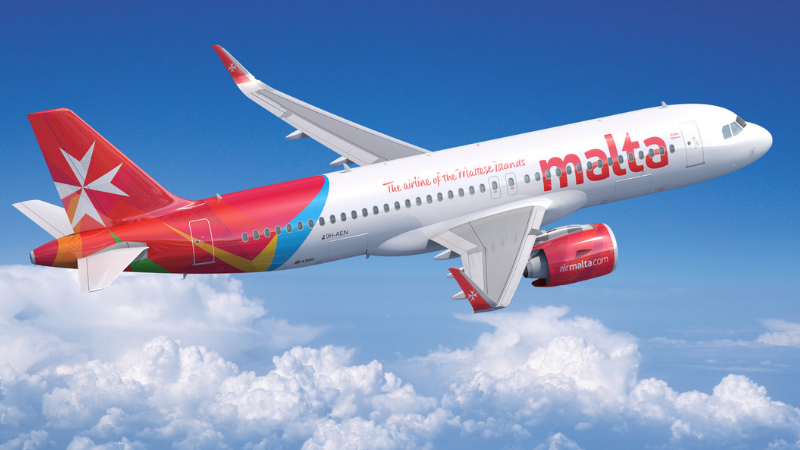Finance Minister Clyde Caruana has repeatedly refused to answer questions about Air Malta’s finances, citing “commercial sensitivity,” in what appears to be a significant change in practice, given that the same government regularly published the company’s statements up to 2018.
In an answer to a parliamentary question filed by Opposition MP Claudio Grech on Monday seeking the publication of Air Malta’s latest financial estimates, Caruana declined to provide the information.
This confirms a departure from Air Malta’s practices up to 2018, the last year in which the company actually submitted its annual financials to the Malta Business Registry.
Requests for comment on the reason for this change have been sent to the official spokesperson of the finance ministry as well as to Air Malta itself. It is not yet known whether the decision to withhold the information came from the company or directly from the government itself.
The ailing airline has been in a precarious financial position since the start of the millennium; in 2012, a state aid package amounting to €200 million was approved by the EU Commission. Up until recently, Caruana was lobbying the EU Commission for another €290 million in state aid following the disastrous impact of COVID-19 which further aggravated the financial issues already being faced by the airline.
While talks with the EU Commission have been ongoing since at least April of this year, on 10 November, the finance minister told Parliament that the negotiations are set to come to an end soon without providing any detail as to when this will be the case. In the same speech, Caruana outlined that the airline spent a total of €435 million in the last 15 years, describing the limited profit made through the sale of assets as unsustainable.
The government’s refusal to publicly disclose the airline’s annual financial report is particularly striking given Caruana’s open admission that the airline requires a lot of work to reverse its precarious financial situation.
Caruana’s failure to respond to the parliamentary question also jars with his previous statements that Air Malta is expected to register losses amounting to anywhere between €25 million to €30 million in 2022, which raises further questions as to why the government is unwilling to share information about the airline’s status over the past three years.
By the end of 2020, the first year in which the COVID pandemic virtually grounded flights across the world for months on end, Air Malta was facing losses exceeding €150 million. The information was revealed by The Shift in an article published on 19 November of that year.
This came despite the government’s decision to sack 69 Air Malta pilots in June 2020 in what was described as an attempt to save the airline. When the decision was reported in April, it was revealed that disgraced former tourism minister Konrad Mizzi had signed an agreement with the pilots’ union which guaranteed them alternative employment in the public sector.
The agreement, which was not approved by Cabinet and was unprecedented in terms of the guarantee being offered, led to a situation in which the burden of some of the pilots’ salaries was essentially taken away from Air Malta and fobbed off onto a government agency named Engineering Resources Ltd.
The agency was, up until February of this year, headed by the disgraced former tourism minister’s father, Lawrence Mizzi. As a result of the sacking of these 69 pilots, Air Malta shaved off around €6 million in annual salary expenses.














FJASK IEHOR TA GVERN KOR R O T T grazzi ghall-ISTILLA TAL-KON RAT MIZZI U L-AKBAR pm li qatt rat Malta.
AIRMALTA is subject to the FOI ACT too. Commercial sensitivity relates to commercial secrets, not company accounts. All companies in Malta are obliged to publish their accounts and audits.
If the gvt controlled company does not do that, it’s because the accounts are cooked, they demonstrate political lies, corruption or all of the above.
Indeed.
A classic example of failure in rule of law. Laws, including company law obligations, should apply in the same manner to all. But the Government, and its inner circle, observe the law only as they please. Optional. Air Malta is a public company in terms of the Companies Act and its obligations to publish the financial statements are even more so because it is government owned and a public interest company. Issa kellmuna MBR, intom li qed taghmlu talbiet eżagerati u bla raguni fuq il privat u l financial services practitioners u tohorgu multi gholja bla sens.
We know why, I think. The company is bankrupt beyond help and was so before Covid. But in order for the EU to allow State help, he cannot admit that. He has to obfuscate and desperately look for more creative accounting. He’ll probably get something because the EU has much more important issues to deal with. Probably could get more though if he was more reasonable about hunting/trapping and passport sales.
€7000 Million debt. There is a lot more of dirt that has been hidden.
I’m one of the many hundreds (if not thousands) of people who are owed ticket refunds by this business – and the fact that it is part owned by the Government does not bode well. Real shame as I love the Island but this experience of losing hard earned money (to my mind fraudulently) has put me off visiting right now. Maybe the Government could resolve this issue to try and distill the bad feeling held by so many people – even if it was a part payment of the thousands owed.